Der digitale Fortschritt hat unser Leben verändert und Daten sind zu einer unserer wertvollsten Ressourcen geworden. In dieser Welt des digitalen Wandels spielen Network Attached Storage (NAS)-Systeme eine entscheidende Rolle. Diese spezialisierten Geräte und Softwarelösungen ermöglichen es uns, Daten über Netzwerke zu speichern, zu organisieren, zu teilen und Dienste bereitzustellen.
So findest du die richtige NAS Software
Aber wie wählt man das richtige NAS Betriebssystem aus? In diesem Blogbeitrag werden wir auf die Grundlagen der verschiedenen NAS-Systeme eingehen. Wir werden deren Anwendungsfälle, die verschiedenen verfügbaren Optionen sowie die Vor- und Nachteile von vorgefertigten NAS-Systemen im Vergleich zu Selbstbau-Alternativen erkunden.
Was ist ein Network Attached Storage?
NAS, oder Network Attached Storage, ist eine clevere Hardware-basierte Lösung, um Daten in einem Netzwerk zentral zu speichern und darauf zuzugreifen. Diese leistungsfähigen Systeme sind je nach Anwendungsfall mit passenden Prozessoren, ausreichend Arbeitsspeicher und mehreren Festplatten ausgestattet. Sie bieten eine Web-Benutzeroberfläche, über die sie konfiguriert werden können. NAS-Systeme können als Datei- und Datenbankserver, Medienserver, Backup-Lösung und vieles mehr fungieren.
Wofür sind NAS-Systeme gut?
NAS-Systeme sind die vielseitigen Werkzeuge der digitalen Welt. Sie ermöglichen es, Daten über Netzwerke zu speichern, zu organisieren und zu teilen. Sie spielen eine entscheidende Rolle in einer Vielzahl von Anwendungsfällen, sei es in Heimnetzwerken oder komplexen Unternehmensumgebungen. Hier sind einige Beispiele:
Nextcloud: Eine Open-Source-Software, die nativ, als App oder in einer Docker-Umgebung auf NAS-Systemen laufen kann und die Synchronisierung von Dateien, Kalendern, Kontakten und mehr über verschiedene Geräte hinweg ermöglicht.
Network File System (NFS): Ein Netzwerkprotokoll, das die nahtlose Dateifreigabe zwischen Computern in einem Netzwerk ermöglicht, insbesondere bei Unix- und Linux-Systemen weit verbreitet.
SMB (Server Message Block): Ein Protokoll, das in lokalen Netzwerken für die Übertragung von Daten zwischen einem Client und einem Server verantwortlich ist.
Anwendungsserver (VM, LXC, Docker): NAS-Systeme können auch als Hosts für Unternehmensanwendungen wie Mail-Server, Web-Server, Datenbanken und virtuelle Maschinen dienen.
Versionierung von Daten: NAS-Systeme bieten oft die Möglichkeit zur Versionierung, wodurch Benutzer auf frühere Versionen von Dateien zugreifen und Änderungen rückgängig machen können.
Weitere Anwendungsmöglichkeiten: Von Multimedia-Streaming über Sicherung und Wiederherstellung bis hin zur Videoüberwachung, NAS-Systeme sind äußerst vielseitig.
Welche NAS-Systeme gibt es?
Synology und QNAP
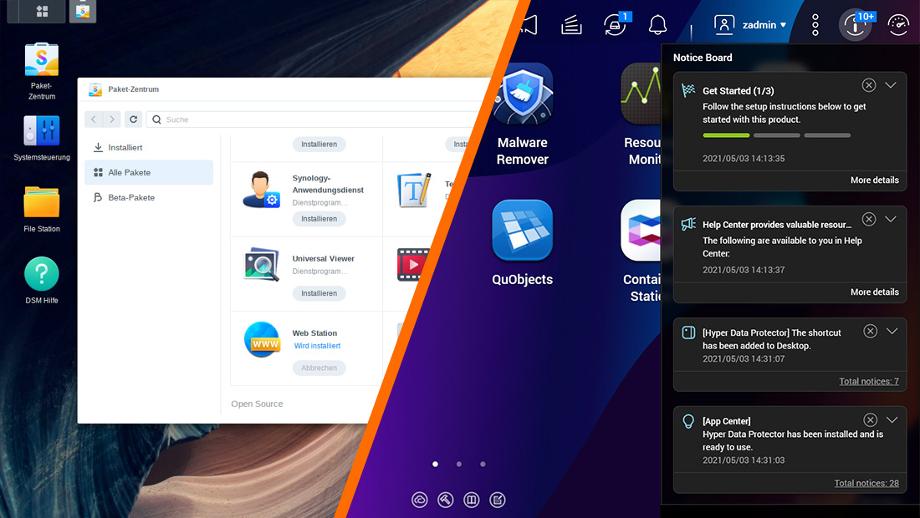
Die Welt der NAS-Systeme bietet eine Fülle von Optionen. Bekannte Marken wie QNAP und Synology zeichnen sich durch eine breite Palette von NAS-Systemen und benutzerfreundliche Software aus.
Neben Synology und QNAP gibt es eine lange Liste an NAS-Herstellern. Zu den bekanntesten zählen:
- Western Digital
- Buffalo
- Seagate
- Netgear
- Asustor
- Drobo
- Thecus
- Zyxel
NAS Software selber bauen
Während etablierte Marken wie QNAP und Synology zweifellos erstklassige NAS-Systeme anbieten, gibt es eine Welt des NAS-Baus, die voller Möglichkeiten und Potenzial steckt. Selbstbau-NAS-Systeme haben in den letzten Jahren stark an Popularität gewonnen, da sie Benutzern die volle Kontrolle über Hardware und Software ermöglichen. Wenn du ein NAS-System erstellst, kannst du es auf deine spezifischen Anforderungen und Vorlieben zuschneiden und gleichzeitig die Kosten im Griff behalten. Diese Option ist nicht nur für Technik-Enthusiasten und IT-Profis interessant, sondern auch für jeden, der nach einer maßgeschneiderten, kostengünstigen Lösung für die Datenspeicherung sucht.
Unter den Optionen für Selbstbau-NAS-Systeme gibt es einige herausragende Möglichkeiten, die deine kreativen Gestaltungsfähigkeiten zum Leben erwecken können:
Openmediavault
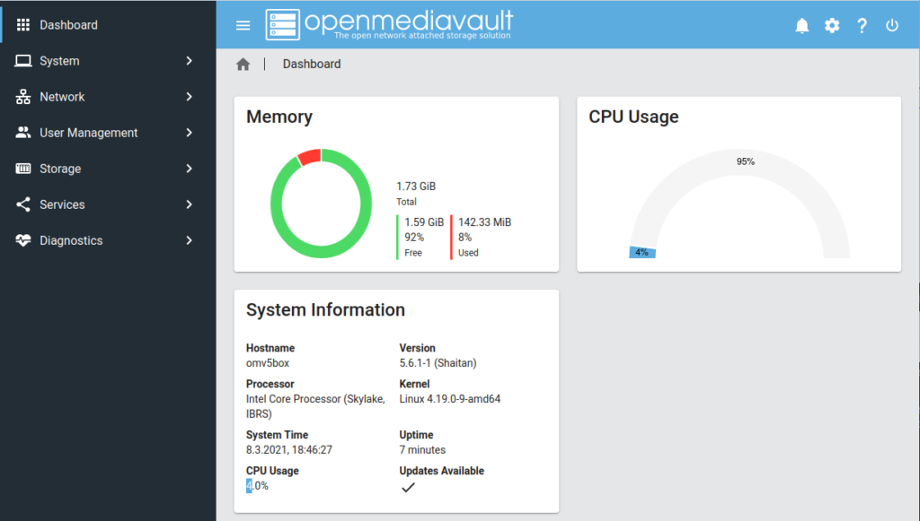
Dies ist eine beeindruckende Open-Source-Software, die es Benutzern ermöglicht, ihr eigenes NAS-System auf handelsüblicher Hardware zu erstellen. Openmediavault bietet eine benutzerfreundliche Oberfläche, um dein NAS zu konfigurieren, und ermöglicht es Ihnen, die Leistung und Speicherkapazität nach Bedarf anzupassen. Mit einer Vielzahl von verfügbaren Plug-Ins und Erweiterungen kannst du dein NAS-System an nahezu jede erdenkliche Anforderung anpassen.
Unraid
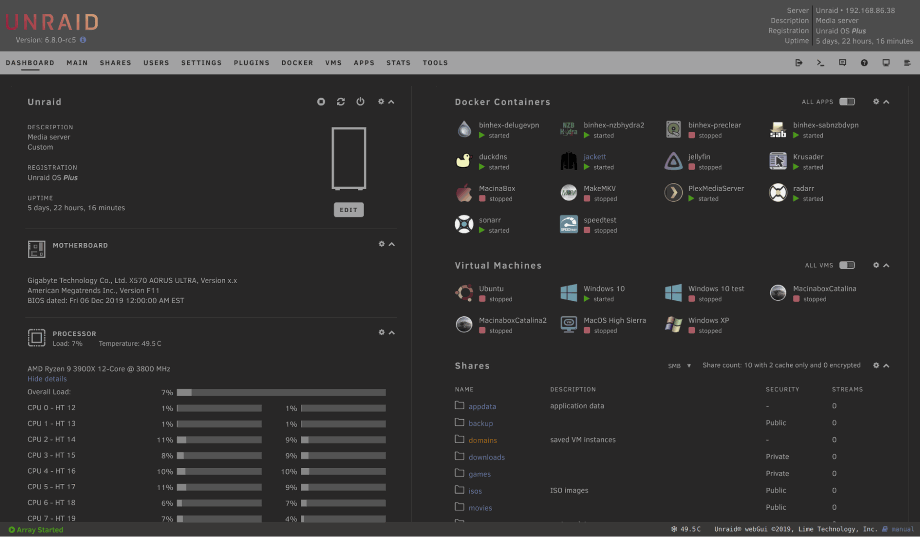
Unraid ist eine kostenpflichtige Lösung, die mit erweiterten Funktionen als Openmediavault Alternative glänzt. Sie bietet Datenredundanz, was bedeutet, dass deine Daten sicherer sind als je zuvor. Unraid ermöglicht auch die Unterstützung von Docker-Containern, was die Bereitstellung von Anwendungen und Diensten auf deinem NAS-System zu einem Kinderspiel macht. Diese Funktionen machen Unraid zu einer leistungsstarken Wahl für anspruchsvollere Benutzer.
TrueNAS Scale
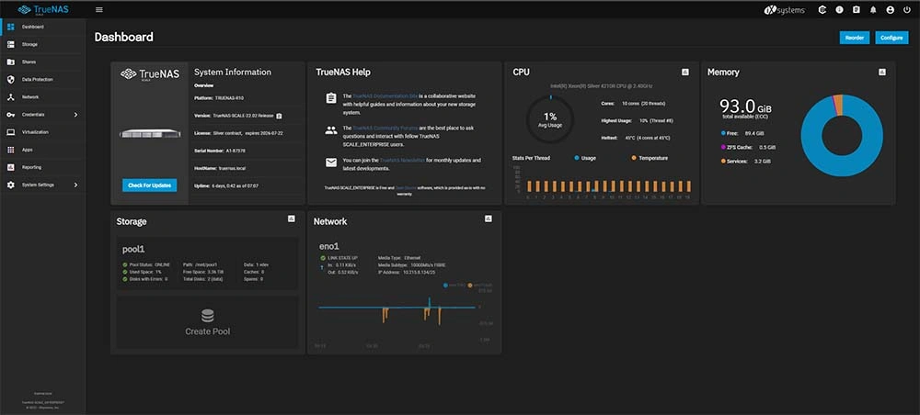
Wenn du auf der Suche nach einer Open-Source-Alternative zu kommerziellen NAS-Systemen bist, solltest du TrueNAS Scale in Betracht ziehen. Mit einer beeindruckenden Liste von Funktionen ist TrueNAS Scale sowohl für Unternehmen als auch für Heimanwender geeignet. Basierend auf dem bewährten Debian-Betriebssystem erhältst du Zugriff auf bewährte Open-Source-Technologien und eine leistungsstarke NAS-Lösung, die sich deinen Anforderungen anpasst.
TrueNAS Core
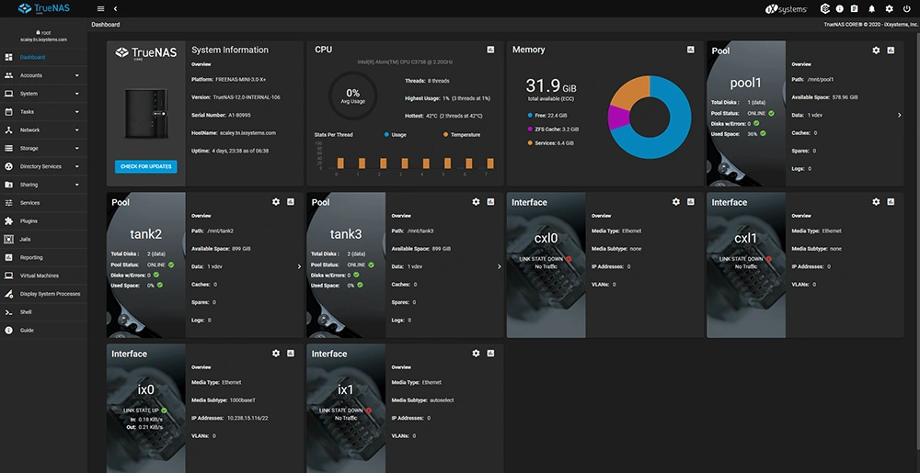
Truenas Core ist eine hochwertige Open-Source-Lösung für NAS-Systeme, die auf dem bewährten Betriebssystem FreeBSD basiert. Diese leistungsstarke Kombination bietet eine breite Palette von Funktionen und Anwendungsmöglichkeiten. Truenas Core ist ebenfalls für Unternehmen und Heimanwender geeignet und ermöglicht es dir, deine NAS-Umgebung nach deinen individuellen Anforderungen zu gestalten. Mit der Stabilität und Flexibilität von FreeBSD als Basis kannst du sicher sein, dass die Speicherung und Verwaltung deiner Daten in guten Händen ist.
Ob du nun deine Daten sichern, Multimedia-Inhalte streamen oder anspruchsvolle Anwendungen hosten möchtest, Selbstbau-NAS-Systeme bieten Flexibilität und Kontrolle. Es ist Zeit, die Welt der NAS-Systeme nach deinen eigenen Vorstellungen zu gestalten und eine Lösung zu schaffen, die perfekt zu deinen Bedürfnissen passt.
Warum kann ein NAS in IT-Infrastrukturen wichtig sein?
In einer Zeit von Big Data und wachsenden digitalen Anforderungen spielt ein NAS-System eine zentrale Rolle in IT-Infrastrukturen. Es ist mehr als nur ein Speichergerät - es ist eine strategische Komponente, die die Effizienz und Leistungsfähigkeit einer IT-Infrastruktur erheblich steigern kann. Egal ob für kleine Unternehmen oder große Konzerne, NAS-Systeme erfüllen die wachsenden Anforderungen an Datenverwaltung, Sicherung und Zugänglichkeit.
Was kann von einem NAS nicht abgedeckt werden?
Obwohl NAS-Systeme äußerst leistungsstarke und vielseitige Werkzeuge sind, gibt es einige Bereiche, in denen sie an ihre Grenzen stoßen. Hier ist eine Auflistung wichtiger Aspekte, die von einem NAS nicht immer vollständig abgedeckt werden können:
Begrenzte Rechenleistung im Vergleich zu dedizierten Servern:
NAS-Systeme sind in erster Linie für die Speicherung und gemeinsame Nutzung von Daten konzipiert. Während sie über ausreichend Rechenleistung verfügen, um viele Aufgaben zu bewältigen, sind sie nicht so leistungsstark wie dedizierte Server. Dies bedeutet, dass sie möglicherweise nicht die beste Wahl für rechenintensive Anwendungen wie komplexe Datenbankverarbeitung oder High-End-Virtualisierungsumgebungen sind.
Eingeschränkte Unterstützung für komplexe Anwendungen:
NAS-Systeme sind hervorragend für die grundlegenden Aufgaben der Datenspeicherung, Sicherung und gemeinsamen Nutzung geeignet. Dennoch sind sie nicht die ideale Plattform für hochspezialisierte oder besonders komplexe Anwendungen. Für solche Fälle sind dedizierte Server oder spezialisierte Hardware erforderlich, um die erforderliche Leistung und Funktionalität bereitzustellen.
Die Leistung hängt von der Qualität der Hardware ab:
Die Leistung eines NAS-Systems hängt in erheblichem Maße von der Qualität der verbauten Hardware ab. Die Wahl der Festplatten, des Prozessors und des Arbeitsspeichers kann einen erheblichen Einfluss auf die Leistungsfähigkeit des Systems haben. Ein NAS mit minderwertiger Hardware kann die Leistung und Zuverlässigkeit beeinträchtigen, insbesondere wenn es um Aufgaben wie Datensicherung, Streaming oder Virtualisierung geht.
Es ist wichtig, diese Einschränkungen zu berücksichtigen und sicherzustellen, dass ein NAS-System für die geplanten Aufgaben geeignet ist. Bei anspruchsvolleren Anwendungen und Workloads kann es notwendig sein, auf dedizierte Server oder spezielle Lösungen zurückzugreifen, um die erforderliche Leistung und Skalierbarkeit zu gewährleisten. In solchen Fällen sollte die Auswahl der Hardware sorgfältig erfolgen, um sicherzustellen, dass sie den spezifischen Anforderungen gerecht wird.
NAS Software FAQ
Für welches NAS-System sollte ich mich entscheiden?
Die Auswahl des richtigen NAS-Systems ist eine entscheidende Phase, die von verschiedenen Faktoren abhängt und gut überlegt sein sollte. Um die bestmögliche Wahl zu treffen, solltest du deine individuellen Anforderungen, dein Budget und deine technischen Fähigkeiten sorgfältig berücksichtigen. Im Wesentlichen stehen zwei Hauptkategorien von NAS-Systemen zur Auswahl:
Fertige NAS-Systeme, wie beispielsweise QNAP und Synology
Vorteile:
- Benutzerfreundliche Oberflächen: Diese vorgefertigten Lösungen bieten oft intuitive Benutzeroberflächen, die die Konfiguration und Verwaltung vereinfachen. Selbst Anwender ohne umfassende IT-Kenntnisse können schnell damit arbeiten.
- Vorkonfigurierte Software und Apps: Fertige NAS-Systeme sind in der Regel bereits mit einer Vielzahl von vorinstallierten Anwendungen und Diensten ausgestattet. Dies ermöglicht eine schnelle Inbetriebnahme und Nutzung.
- Garantie und Support: In der Regel erhältst du eine Herstellergarantie und Zugang zum Kundensupport. Bei Problemen können Sie sich an den Hersteller wenden, um Unterstützung zu erhalten.
Nachteile:
- Höhere Anschaffungskosten: Fertige NAS-Systeme haben in der Regel höhere Anschaffungskosten im Vergleich zu Selbstbau-Optionen. Dies kann für Anwender mit begrenztem Budget ein Faktor sein.
- Eingeschränkte Anpassungsmöglichkeiten: Obwohl sie benutzerfreundlich sind, bieten vorgefertigte NAS-Systeme begrenzte Anpassungsmöglichkeiten. Sie sind darauf ausgelegt, eine breite Palette von Benutzern abzudecken, aber möglicherweise nicht alle speziellen Anforderungen.
Selbstbau und Open Source-Lösungen, wie Openmediavault, Unraid oder Truenas Scale:
Vorteile:
- Volle Kontrolle über Hardware und Software: Selbstbau-NAS-Systeme bieten Ihnen die Freiheit, die Hardwarekomponenten und die Software nach deinen eigenen Vorstellungen auszuwählen und anzupassen. Dies ermöglicht es dir, ein System zu erstellen, das genau deinen Anforderungen entspricht.
- Skalierbarkeit und Anpassungsfähigkeit: Diese Lösungen sind äußerst flexibel und skalierbar. Dau kannst dein NAS-System im Laufe der Zeit erweitern und an sich ändernde Bedürfnisse anpassen.
- Kostengünstigere Option: Selbstbau-NAS-Systeme bieten in der Regel eine kostengünstigere Lösung, insbesondere wenn du bereits über einige der benötigten Hardwarekomponenten verfügst.
Nachteile:
- Erfordert technisches Wissen für die Konfiguration: Der Selbstbau eines NAS-Systems erfordert technisches Wissen und die Fähigkeit, Hardware und Software zu konfigurieren. Dies kann eine Hürde für Anwender sein, die in diesem Bereich nicht erfahren sind.
- Keine vorkonfigurierten Lösungen: Im Gegensatz zu vorgefertigten NAS-Systemen müssen Selbstbau- und Open-Source-Lösungen von Grund auf konfiguriert werden. Dies erfordert Zeit und technisches Know-how.
Die Entscheidung zwischen diesen beiden Optionen hängt von deinen individuellen Bedürfnissen und Prioritäten ab. Wenn Benutzerfreundlichkeit und eine schnelle Inbetriebnahme im Vordergrund stehen, sind vorgefertigte NAS-Systeme eine gute Wahl. Wenn du jedoch volle Kontrolle, Anpassungsfähigkeit und Kostenersparnis bevorzugst und bereit bist, dich mit der Konfiguration auseinanderzusetzen, sind Selbstbau- und Open-Source-Lösungen die richtige Wahl. Es ist wichtig, deine Anforderungen und Ressourcen sorgfältig zu bewerten, um die optimale Entscheidung zu treffen.
Unser Tipp: Openmediavault - Maximale Kontrolle über das Hostsystem
Wenn es darum geht, die volle Kontrolle über dein NAS-Hostsystem zu haben, gibt es eine klare Wahl: Openmediavault. Dieses beeindruckende Open-Source-NAS-System hebt sich von der Konkurrenz ab, indem es dir die Möglichkeit bietet, dein System bis ins kleinste Detail anzupassen und zu optimieren. Mit Openmediavault kannst du die Hardware, die Software und die Konfiguration so gestalten, wie es deinen individuellen Anforderungen entspricht.
Ob du ein Technik-Enthusiast bist, der jedes Element seines NAS-Systems fein abstimmen möchte, oder ein Profi, der spezielle Anforderungen erfüllen muss, Openmediavault ermöglicht es dir, deine Vision ohne Kompromisse umzusetzen. Dies ist die Lösung für all diejenigen, die die absolute Kontrolle über ihr NAS-Hostsystem suchen. Willkommen in der Welt von Openmediavault, wo deine Einstellungen und Anpassungen keine Grenzen haben.
Fazit
NAS-Systeme sind die digitalen Allrounder, die in verschiedenen Umgebungen von großem Nutzen sein können. Egal, ob du dich für eine vorgefertigte Lösung oder den Selbstbau entscheiden, die richtige NAS-Lösung kann Ihnen dabei helfen, Daten effizient zu speichern, zu sichern und zu teilen. Bei der Auswahl sollten deine individuellen Anforderungen im Mittelpunkt stehen, und es ist wichtig, sorgfältig zu analysieren, welches System am besten zu deiner IT-Infrastruktur passt.
Du wünschst dir eine zuverlässige Lösung und benötigen Unterstützung? Bist du vielleicht noch unschlüssig, welche NAS Software die passende für dein Unternehmen sein könnte? Dann melde dich gern jederzeit bei uns! Wir freuen uns auf deine Kontaktanfrage und stehen dir mit unserer professionellen IT Analyse zur Seite!
Quellen: truenas.com, unraid.net, openmediavault.org, synology.com, qnap.com
NAS-Systeme im Vergleich